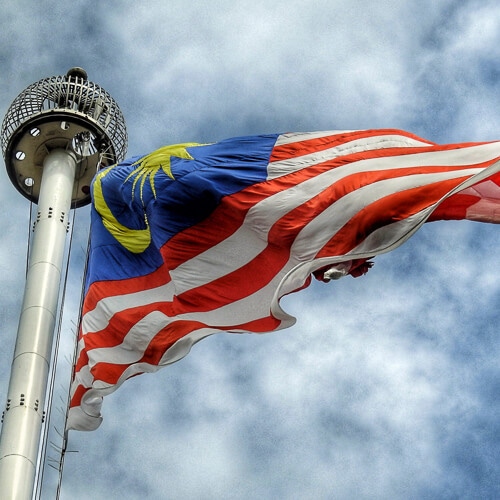
The single national network is an attractive concept but inevitably brings a whole new set of problems; just ask anyone involved in Australia's NBN.
It's no surprise then that Malaysia's national 5G network is embroiled in yet another flap.
The Malaysian SWN, or single wholesale network, is notable for two reasons: it's the only one of its kind, and operators are reluctant to go along with it.
Figure 1:  Flagging issues: Malaysia's single national network is attractive - but brings a whole new set of problems; just ask anyone involved in Australia's NBN.
Flagging issues: Malaysia's single national network is attractive - but brings a whole new set of problems; just ask anyone involved in Australia's NBN.
(Source: mkjr_ on Unsplash)
In the latest controversy, Reuters reported Wednesday that none of the incumbent operators has been willing to accept the wholesale price terms.
Digital Nasional Berhad (DNB), the government-owned entity created to manage the project, fired back that it has not yet issued the formal reference access offer (RAO) that contains the pricing details.
So, officially, DNB's terms have not been rejected. Operators will receive the offer next month, DNB says.
Mixed messages
But we know DNB has engaged in "extensive discussions" with the industry because it tells us so in this third party story posted to its website. One wonders what these discussions involve if not the terms and conditions of access to the SWN.
Bear in mind Malaysian authorities aren't terribly comfortable with being called out in public, so you will hardly find any direct criticism of the SWN from operators.
But you will find it from the GSMA, the global operators' body, which issued its own analysis pointing out that SWN schemes usually fail.
It's true that the SWN brings cost savings and avoids duplication, but it requires a whole new regulatory and financial framework and imposes new behavior on operators used to competing on network coverage and quality.
It also means operators could end up with stranded 4G assets incapable of being upgraded or refarmed, as Maxis, one of the biggest telcos, has warned.
Critically, the new wholesaler has to come up with its own business model. That boils down to the interconnection prices it charges retail operators and how much they are permitted to charge in return. It's a big deal for all parties - no wonder people are leaking to the press.
But it's also not clear how much the SWN will cost. When it contracted Ericsson four months ago the DNB said it would cost 11 billion ringgit over ten years.
Galloping inflation
DNB CEO Ralph Marshall now says the cost could go as high as 20 billion.
He told a local newspaper this includes 4 billion to Ericsson for network equipment, 8.5 billion to operators for network access, 1 billion ringgit each to regulator MCMC and utility company Tenaga Nasional, and 4 billion to DNB for network operations.
Want to know more about 5G? Check out our dedicated 5G content channel here on
Light Reading.
The DNB has just clinched a 400 million ringgit ($96.0 million) loan working capital loan package, on top of an 800 million ringgit syndicated loan. It says it will seek an additional 1.9 billion ringgit in debt.
Even after the pricing deal is done, plenty of other big decisions need to be made. A whole new industry framework is required. The SWN is harder than it looks.
Related posts:
— Robert Clark, contributing editor, special to Light Reading
Read more about:
AsiaAbout the Author(s)
You May Also Like




_International_Software_Products.jpeg?width=300&auto=webp&quality=80&disable=upscale)







